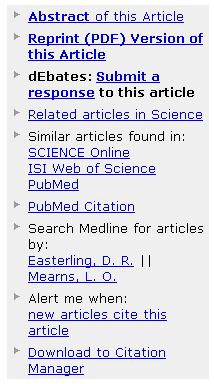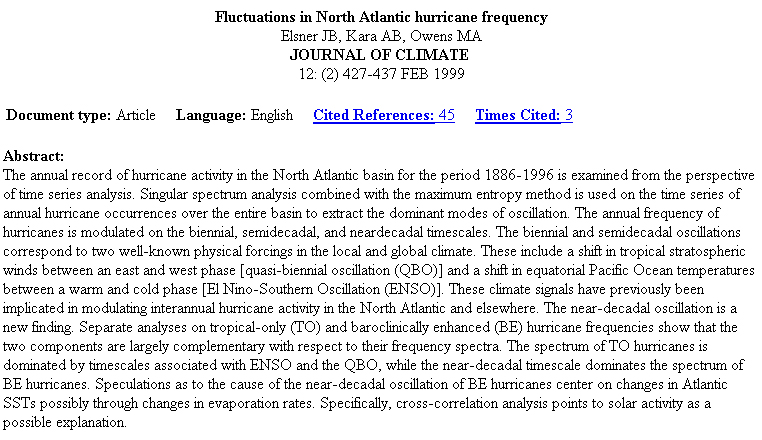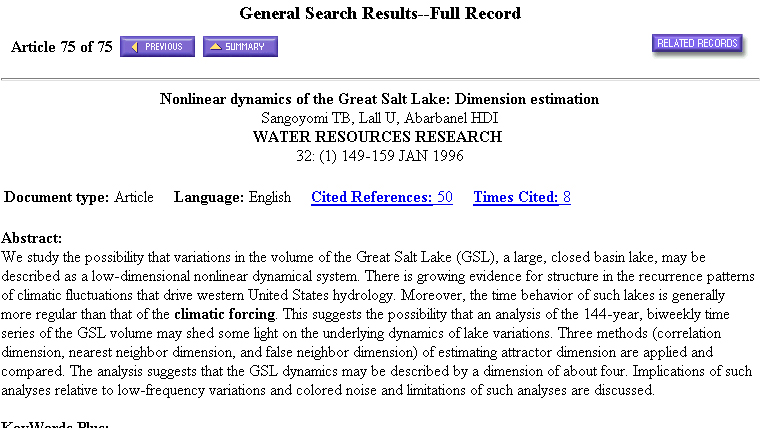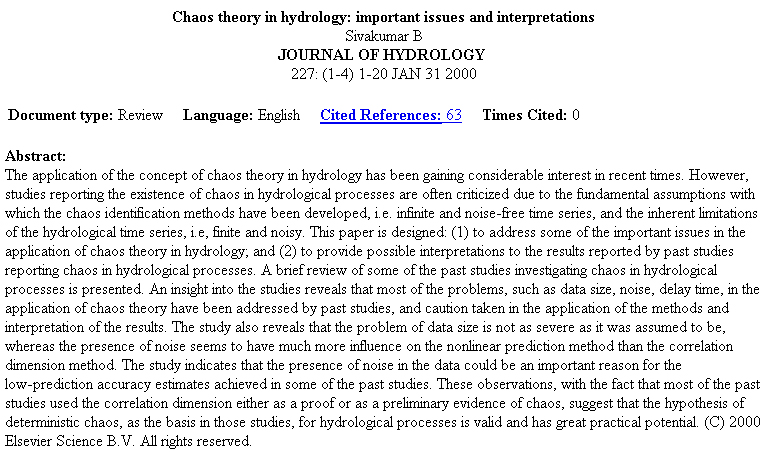Information Resources for Geology 141: Climate
Change
January 2003
See a perhaps-more-useful linked page of search examples for 14 January's class. Material below is updated and retreaded from 2001.
There's a page of materials for the Water Resources course that gives a general introduction to the art of finding what you need, including uses of Annie and various databases.
Science magazine is an absolutely essential resource, because
of its audience (loosely, 'scientists' and people who have reason to keep
track of what's happening in the sciences) and its commitment to
following scientific topics that have implications in public policy. Science
combines a news magazine covering the whole range of scientific disciplines
(and written so that non-specialists can understand) with a platform for
the publication of primary research articles that are judged by
the Editors to have particular importance. Science is a weekly publication,
so it piles up.
-
Science is available on the campus network in FULL TEXT,
with an excellent search interface, October 1995-2003.
-
We have access to Science in full text all the way back to 1880.
-
Science is linked to an array of other journals and to the
amazing stupendous fantastic Web of Science database, which I'll
detail further below.
There are links to Science 1995-present on the Science Library's
Periodical pages, and also on each of the departmental pages I've built
for the sciences. The 1880-1995 archive is available through JSTOR, with
links on those Periodical pages or directly via www.jstor.org
But so what? If I do a search for "global climate" in title or abstract,
on 16 Jan I get 72 hits. Here's a link to one of them:
GLOBAL
WARMING: Draft Report Affirms Human Influence (Richard A. Kerr, Volume
288, Number 5466, Issue of 28 Apr 2000, pp. 589-590)
This is a news article, not a report of primary research findings,
but it's quite useful for what it tells you:
"last week, the group, the United Nations-sponsored Intergovernmental
Panel on Climate Change (IPCC), released the draft of a new report concluding
"that there has been a discernible human influence on global climate." If those words
hold up under further expert and governmental review, they would be the strongest official
pronouncement yet that human-induced warming is real."
...and even more useful for the sidebar feature that will find you Similar
articles. We don't need to know how the algorithm works to enjoy its
fruits.
One of the pointers is to The
Ascent of Atmospheric Sciences ( Paul J. Crutzen and Veerabhadran Ramanathan,
Volume 290, Number 5490, Issue of 13 Oct 2000, pp. 299-304), which begins
with this:
Atmospheric science matters to everyone every day. It has been
infiltrating public awareness lately for compelling reasons: the Antarctic ozone
hole, global warming, and El Niño, a combined atmosphere-ocean phenomenon that causes
severe weather. The first two are side effects of the industrial revolution, and El Niño
is nature's warning against taking good weather for granted. Atmospheric science has become
a multidisciplinary, high-tech activity rife with new and sophisticated instrumentation,
computers, information technology, and measurement platforms, including satellites and
aircraft.
Another leads to Climate
Extremes: Observations, Modeling and Impacts (David Easterling et al.,
Volume 289, Number 5487, Issue of 22 Sep 2000, pp. 2068-2074), which offers
us these options in a sidebar:

Here's where things start to get really interesting: if I click on
the link to ISI Web of Science I get a large set (920!) of "Related
records" (many in journals we don't have at W&L, but hey...) If I go
back to one for February 1999 and look at its record, here's what I see:

What's revolutionary about this is the links to citations.
We can see not only the article's bibliography, but ALSO the articles whose
authors thought enough of this one to cite it themselves. That's really
cool, really a great advance in how we can deal with scientific literatures.
Better yet, we now have direct access to ISI's Web of Science, though
our coverage is only 1991-present, via links on various Science Library
Web pages. While its most unique power is the access to citations of
articles, it's also a pretty powerful search engine for the sciences, covering
more than 8000 "high impact" journals.
If I do a search for "climatic forcing" in Web of Science
I get 75 hits (from 4.7 million records searched...). Here's the
oldest record in the set (#75):

We get the References links and also a Related Records
button,
which does wonders... such as leading to this recent summary:

Amazing. How would we ever have found this one?
Another bit of serendipity: when I was preparing this class two years ago I just happened to pick up the latest Science and see (in "This Week in Science") a reference to "Forcing Glacial Cycles"... and sure enough there's a link to an article not unrelated to global climate change: Orbital Forcing of the Marine Isotope Stage
9 Interglacial
(C. H. Stirling et al.)
Milankovitch orbital forcing theory has been used to assign time scales to many
paleoclimate records. However, the validity of this theory remains uncertain, and
independent sea-level chronologies used to test its applicability have been restricted largely
to the past ~135,000 years. Here, we report U-series ages for coral reefs formed on
Henderson Island during sea-level high-stands occurring at ~630,000 and ~330,000 years
ago. These data are consistent with the hypothesis that interglacial climates are forced by
Northern Hemisphere summer solar insolation centered at 65°N latitude, as predicted by
Milankovitch theory.
...which is just to say that things change rapidly on the frontiers of the sciences.
The serendipity for 2003 is in this week's Science:
From Anchovies to Sardines and Back: Multidecadal Change in the Pacific Ocean (Francisco P. Chavez et al., Volume 299, Number 5604, Issue of 10 Jan 2003, pp. 217-221)In the Pacific Ocean, air and ocean temperatures, atmospheric carbon dioxide, landings of anchovies and sardines, and the productivity of coastal and open ocean ecosystems have varied over periods of about 50 years. In the mid-1970s, the Pacific changed from a cool "anchovy regime" to a warm "sardine regime." A shift back to an anchovy regime occurred in the middle to late 1990s. These large-scale, naturally occurring variations must be taken into account when considering human-induced climate change and the management of ocean living resources.
A search for "similar articles" in Science brings us 66 hits, one of which is Ecological Effects of Climate Fluctuations (Nils Chr. Stenseth et al., Volume 297, Number 5585, Issue of 23 Aug 2002, pp. 1292-1296). This one has a link to a "search for similar articles in ISI Web of Science" (which seems not to work at the moment... though I can go to Web of Science myself and get more than 2000 articles that WoS says are "related"...the first of those is a 2001 paper from Oecologia: Ecological effects of the Northa Atlantic Oscillation, which we can get to full tect of, via the Oecologia full text link in Annie... and THAT one leads to A globally coherent fingerprint of climate change impacts across natural systems
(Parmesan C, Yohe G
NATURE
421 (6918): 37-42 JAN 2 2003
Abstract:
Causal attribution of recent biological trends to climate change is complicated because non-climatic influences dominate local, short-term biological changes. Any underlying signal from climate change is likely to be revealed by analyses that seek systematic trends across diverse species and geographic regions; however, debates within the Intergovernmental Panel on Climate Change (IPCC) reveal several definitions of a 'systematic trend'. Here, we explore these differences, apply diverse analyses to more than 1,700 species, and show that recent biological trends match climate change predictions. Global meta-analyses documented significant range shifts averaging 6.1 km per decade towards the poles ( or metres per decade upward), and significant mean advancement of spring events by 2.3 days per decade. We define a diagnostic fingerprint of temporal and spatial 'sign-switching' responses uniquely predicted by twentieth century climate trends. Among appropriate long-term/large-scale/multi-species data sets, this diagnostic fingerprint was found for 279 species. This suite of analyses generates 'very high confidence' (as laid down by the IPCC) that climate change is already affecting living systems.)
...and another link to supplementary material: Incorporating Climatic Oscillators in population dynamics models: some methodological reflections (Chan and Stenseth)
Having nothing to do for 5 minutes,
I did a search in the JSTOR archive of Science to see what I could find out about the occurrence of the phrase 'global climate change'. This found 112 articles, which I had sorted by age (oldest first) and then saved as a Web page. (By the way, the first instance of the phrase "global climate" comes from 1963 --then appears again in '65, '66, '69, '70...)
So. Science as online full text and ISI's Web of Science
are Wonders of the Age... but there's more. On Dave's Periodical
Research page he points you to a whole raft of journals which he says "have
articles related to earth history, ecology, or atmospheric chemistry/physics".
The stupendous thing is that we have online full text access to
quite a few of these, and the really spectacular other thing is
that quite a few of these journals are interlinked and tied in with
Web of Science. Here's a
list of those journals with links to the online versions.
Another realm of information is the Web, which has (if anything) too
much... so ?how to get to what's worthwhile? The answer lies in the various
search engines, but requires some inventiveness. A search for 'global
climate change' at google.com produces 165,000 hits... some of which are
certainly worthwhile. A few of them:
Pew Center for Global
Climate Change
Global Climate Change
(a Congressional Research Service Issue Brief by Wayne A. Morrissey and
John R. Justus [Resources, Science, and Industry Division], November
27, 2000) --see also the Global
Climate Change Briefing Book of which this is a part
World Bank on Global
Climate Change
Government
of Canada Climate Change Site
Global Climate Change Digest
(Pacific Institute for Studies in Development, Environment, and Security)
Spotlight:
Climate Change (U.S. Department of State)
Here are some links from an AltaVista search for 'holocene near
climate and graph' which look pretty good.
Steve's
Climate Change page
INGRID Columbia's IRI/LDEO
Climate Data Library
some of the many
Global Change-related Web Sites around the world from USGCRP
NCAR's Climate and Global Dynamics
Division
AN INVENTORY
OF DATA, FOR RECONSTRUCTING 'NATURAL STEADY STATE' CARBON STORAGE IN TERRESTRIAL
ECOSYSTEMS (Jonathan Adams)
Paleoclimate Modeling
from NOAA (see data
page)
2001 Inventory of U.S. Greenhouse Gas
Emissions and Sinks



